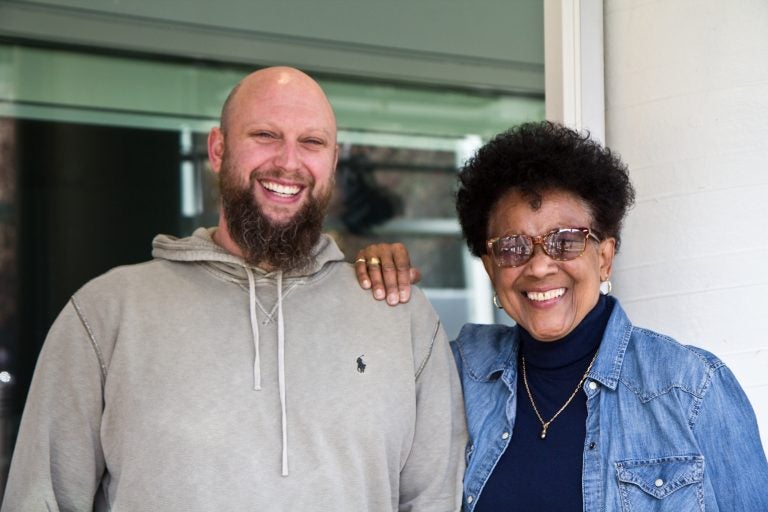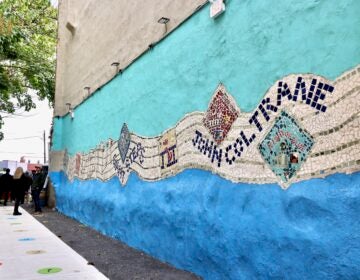Philly free jazz pioneers Sounds of Liberation reunite with new album
Philly’s Sounds of Liberation reunite after unearthed 1970s recording from gains new life with a contemporary audience.
Listen 6:14
Max Ochester of Brewerytown Beats/Dogtown Records and Sounds of Liberation guitarist Monnette Sudler. (Kimberly Paynter/WHYY)
This year, two deeply emotional and soulful Philly jazz recordings made in the early 1970s were dusted off and brought back to life.
Newly issued and reissued tracks by the seven-member ensemble Sounds of Liberation are available on the revamped Dogtown Records in collaboration with Brewerytown Beats Records.
Sounds of Liberation was a band and a social movement that formed in the Germantown and Mt. Airy neighborhoods of Philadelphia.
Members Khan Jamal, Monnette Sudler, Omar Hill, Dwight James, Rashid Salime, Billy Mills, and the late Byard Lancaster played together during the fertile Black artistic movement of their day.
The group performed for different populations, from school children to prisoners, throughout the mid-1970s.
Morning Edition host Jennifer Lynn spoke with guitarist Monnette Sudler and local music archivist and historian Max Ochester, of Dogtown and Brewerytown Beats, who’s helping to introduce thieir mix of free jazz, spiritual jazz, and funk to fresh audiences.
—
Monnette, this group came together in the early 70s. So many of the members were living in Germantown, as were you. You met everyone when you were about 20 years old. You were working at the local YMCA and you had a great interest in jazz guitar. This music is good. When did you know you had something?
Monnette: I think we knew we had something right away. Which is why we kept doing it.
The music is described in a news release that I received as ‘social activism.’ What is going on in the music that is social activism?
Monnette: Well, we did a lot of community events, outdoor festivals. We went into the prisons and did things there. We did a lot of things at the colleges. You know, at that time it was all about Black empowerment and lifting up the community. So we were all in supporting those types of efforts.
The inspiration for these songs, can you think of something that you remember feeling or wanting to put into your guitar work at the time?
Monnette: Some of the titles, “Black Awareness,” “Breath of Life,” “New Horizons” were kind of uplifting and reflective of the times.
Max, you really pushed for this group to reunite, to get back on stage in front of new audiences.
Max: I do have a deep interest in Philadelphia music in general, but this is definitely right up my alley. It’s soulful jazz music with a bit of avant-garde on top. It’s the stuff I really love.
Everybody carries something in these songs.
Monnette: We were doing some of the music at Johnny Brenda’s recently, and I said to Max, “It’s not possible to really recreate that moment [the ‘70s] because it was very organic.”
Max: It’s been a dream just to see them onstage, performing together. Two times that they’ve performed now. It’s been amazing.
You, the original vibes player Khan Jamal, and his son helped release and re-release this music on Dogtown Records, which was initially started by original sax player, the late Byard Lancaster.
Max: Dogtown has a storied past. Byard had a song on his first record in 1969 called “Dogtown.” I grew up in Mount Airy in Germantown. Dogtown was a gang back in the 50s and 60s, in that area. He kind of took that name and made it into something very positive.
Monnette: I mean, Dogtown was the name of the community. And unfortunately, at that time, there was a lot of gang involvement.
What is the great story that is told by this music?
Monnette: Well, I think a great story is that each of us as individuals were contributors to the music. It reflects all our personalities, where we were at that time musically, because music never lies. Music always tells the truth.
WHYY is your source for fact-based, in-depth journalism and information. As a nonprofit organization, we rely on financial support from readers like you. Please give today.





